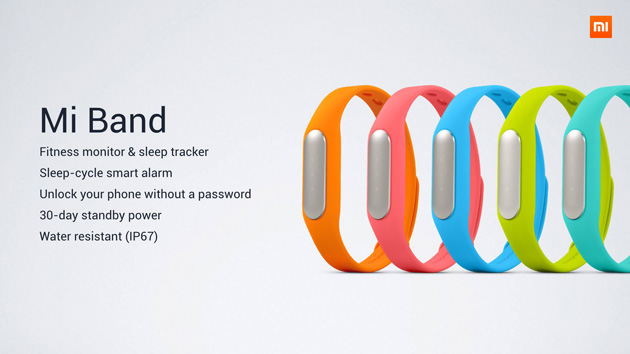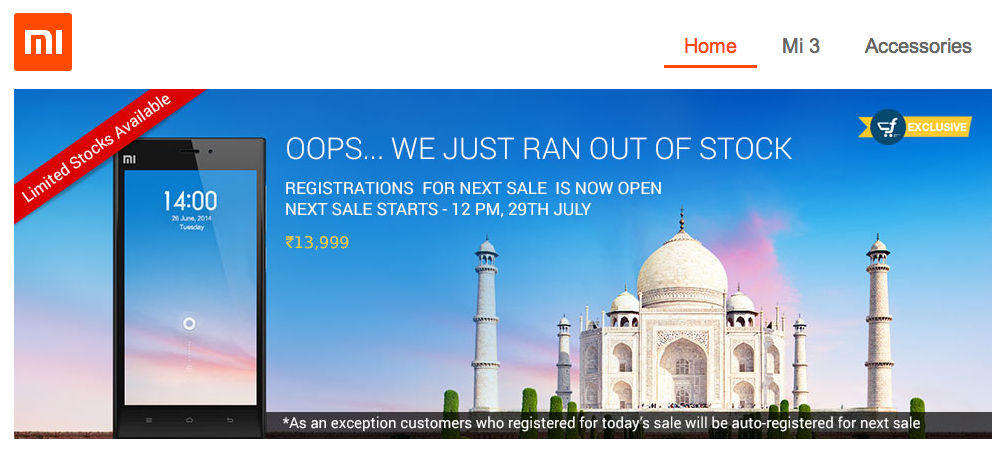By now, you have probably heard about Chinese smartphone manufacturer Xiaomi. Heralded as either “the Apple of China” or “Blatant Copycat”, depending on whom you ask, Xiaomi’s meteoric rise in recent years has caught the eyes of western media, even if its target market has been almost exclusively domestic so far. Popular as their products are in mainland China, even outperforming iPhone in a recent study on leading smartphones’ app usage in China, it is not until recently that a few new developments from the company indicate the big ambition of Little Rice (a literal translation of Xiaomi).
Earlier last week, Xiaomi launched Mi 4, its newest offering in smartphones. Boosting a steel frame, IR blaster, top-tier specs and an affordable $320 pricetag, it is a dazzling product that once again raises the bar on “made-in-China” budget phones. More importantly, the “one more thing” that Xiaomi revealed along with Mi 4 is a $13 sleep and fitness tracking wristband named Mi Band. It also promises a battery that lasts up to 30 days and a proximity-based function that unlocks linked Xiaomi phones without password. By introducing such an aggressively priced, multi-functional smart wearable, Xiaomi is not only gaining an unchallenged head-start in the wearable market in China, but also potentially upending the upscale positioning that most wearables seem to employ in the global consumer tech market.
 Another indication of Xiaomi’s big ambition is its recent foray into the international market. By striking an exclusive partnership with India’s biggest e-commerce operator Flipkart, Xiaomi has launched its smartphones in the subcontinent, marking its first step in entering the Indian market where Samsung and native brands currently dominates. In addition, Xiaomi is starting sales in 10 new markets including Brazil and Russia, while also reaching out to local e-commerce operators for its expansion to the Philippines and Indonesia. Such an extensive roll-out has turned out fairly successful so far, with Xiaomi reportedly more than doubled its year-on-year sales since the international expansion began.
Another indication of Xiaomi’s big ambition is its recent foray into the international market. By striking an exclusive partnership with India’s biggest e-commerce operator Flipkart, Xiaomi has launched its smartphones in the subcontinent, marking its first step in entering the Indian market where Samsung and native brands currently dominates. In addition, Xiaomi is starting sales in 10 new markets including Brazil and Russia, while also reaching out to local e-commerce operators for its expansion to the Philippines and Indonesia. Such an extensive roll-out has turned out fairly successful so far, with Xiaomi reportedly more than doubled its year-on-year sales since the international expansion began.

Formidable as Xiaomi’s rapid growth might seem, the big tech players in the western world don’t need to start worrying about Xiaomi just yet, as the company is still very much focused on markets in the developing countries. Whether its products are quality enough to conquer the global market also remains to be seen. And the company’s long-standing habit of unabashed appropriation of Apple could hinder it from entering the western market where the tech giants are litigious and have deep pockets. Nevertheless, one thing is clear to see: the little rice is aiming big, as the company starts shouting “Xiaomi the money” at the global market.


